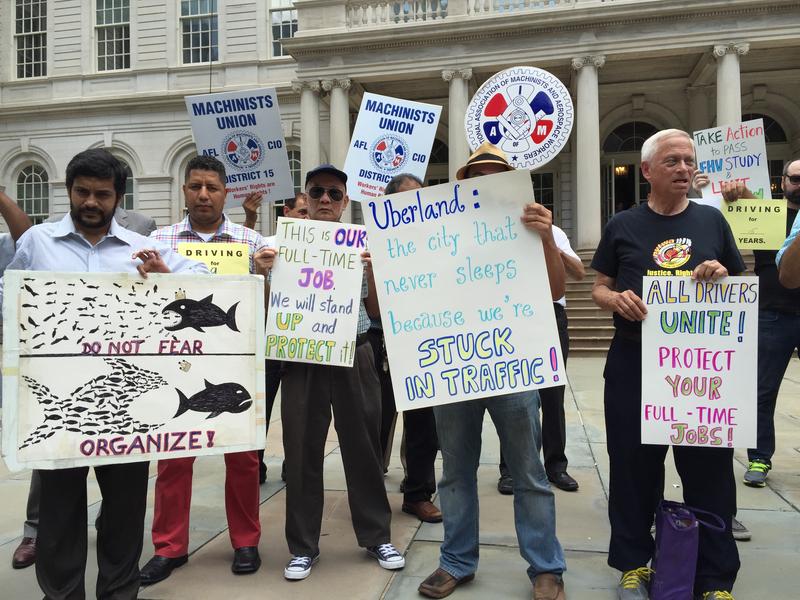
Last year, as a brand-new mayor, Bill de Blasio opposed the expansion of charter schools. A well-financed group struck back with a television ad campaign featuring black and Latino children who said the mayor was ignoring their needs. The mayor backed down.
Now, the Mayor is proposing a cap on Uber's growth -- 25,000 new subscribers join each week, adding to a membership of 2 million in New York City alone.
And some of the same consultants from the charter schools campaign are back and working for Uber — and they're using the same playbook as they did in the anti-charter campaign.
Last Tuesday morning, ads started blanketing the airwaves with the message that the temporary cap would hurt people who aren’t white, riders and driver alike. None of the people in the ads were white.
The ads targeted the hundreds of thousand in contributions de Blasio has received from the yellow cab industry, making them one of his largest donors.
Uber is a giant corporation valued at $50 billion and without a single African-American on its leadership team. In the last eighteen months, the company has spent over $200,000 on an A-list team of powerful lobbyists in New York. Its campaign includes mailers, robocalls to constituents in key city council districts, and a public meeting at Sylvia's Soul Food, the Harlem icon. The meeting was organized by David Plouffe, President Obama’s former strategist, who reached out to the Rev. Al Sharpton.
When we asked Uber for comment on this race-based appeal, they had the Rev. Jacques Andres de Graff, the assistant pastor of the Canaan Baptist Church in Harlem, call us back. "It doesn’t make me uncomfortable," he said. He said that Uber's strategy is a smart one; the company knew it would be effective, since people of color are a base of support for the administration and the city council.
It's true that there's little love in the city for the yellow cab industry; Uber is so popular here that it's growing at a rate of 25,000 new subscribers a week in New York. But the company is also one of the most aggressive around. They're jerks, one former city official said (and that's the family-friendly adjective). But, he said, the company is right — there's a call for more cars for hire, and a call to loosen the stranglehold of the big fleet owners, whose workers drive for 12-hour shifts, with no overtime or benefits.
But a newly-formed coalition called Justice for Drivers held a rally in front of City Hall Tuesday to support the mayor — and "counter Uber's self-serving racial strategy," according to a press release.
The coalition is composed of unions, grassroots organizations, and cab drivers, and they're backing legislation that would cap Uber's growth while the city studies its effect on traffic.
Bhairavi Desai, the head of the New York Taxi Workers Alliance, says a flood of new Uber cars is clogging city streets, making it harder for regular working New Yorkers to get around.
"We're here to say to Uber that these are our streets," she told the cheering crowd. "It's not Wall Street."
She was joined at the podium by City Council member Ydanis Rodriguez, who said his support of the legislation put him squarely in Uber's crosshairs. Many of his constituents, he said, received a mailing that said if passed, the legislation would kill thousands of jobs and damage small businesses.
"You heard that right," he said. "A company valued at over $50 billion just called itself a small business."
For its part, Uber says its drivers make good wages, and it's eager to work with the de Blasio administration on other issues. It challenged the mayor to a live debate about their differences. But de Blasio is not biting.
"I don't debate with private corporations," he said. "Let's be clear, Uber is a multi-billion dollar corporation and they're acting like one. They're looking out for their corporate bottom line. They're putting their profits over all other considerations."
One participant at Monday's rally was cab driver Sergio Cabrera. He said he's not opposed to Uber — he just wants them to play by the same rules as the yellow cab industry. Besides, he said, the company isn't all that.
"The only innovation I really see in Uber," he said, "is how they have managed to get honest, working New Yorkers to pay them two and three and four times the going rate in the name of dynamic pricing."
The legislation may come before City Council later this week.
